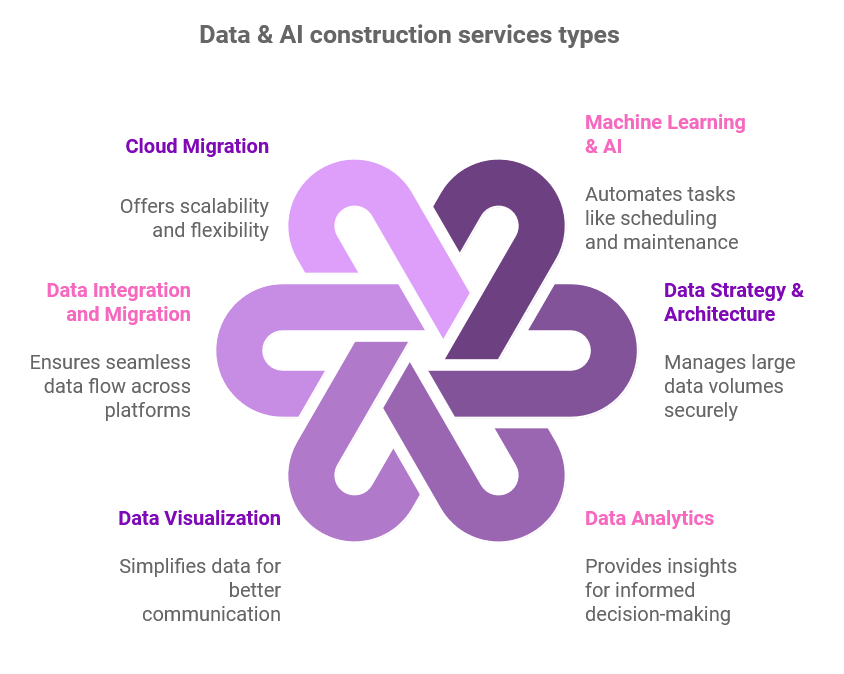Data & AI construction services partner
by
Metam technologies

Abstract
Data & AI services in construction include predictive analytics and process optimization. Key focus areas are partner selection, collaboration, cost management, and success measurement. Metam Technologies stands out as an expert.
Table of Content
What types of Data & AI services are offered for construction industry?

What questions to ask potential construction AI data services partners?

How to ensure effective communication and collaboration with the construction AI data partner?

Key considerations for cost and timelines in choosing a Data & AI construction partner

How will the success of Data & AI construction services be measured?

Metam Technologies: Expert in data and AI construction services

In today’s fast-paced, data-driven economy, Data & AI construction services have become indispensable for organizations aiming to stay ahead of the competition. Leveraging Artificial Intelligence (AI) not only boosts operational efficiency but also opens doors to transformative innovation. However, navigating the intricate and rapidly evolving world of Data & AI services can be challenging without the right expertise.
Choosing a strategic Data and AI construction services partner is critical to unlocking the full potential of AI, achieving measurable ROI, and ensuring long-term success. This guide outlines key factors to consider when selecting construction AI partner, helping organizations align cutting-edge AI solutions with business goals to drive sustainable growth.
What types of Data & AI services are offered for construction industry?
Embarking on a successful Data and Artificial Intelligence journey in the construction industry requires a deep understanding of the services available. The right partner should offer a comprehensive suite of services tailored to construction needs, enabling seamless integration of AI into operations such as project management, design, and site optimization.
Let’s explore the various types of Data & AI construction services, emphasizing their role in transforming processes and driving better outcomes:

- Machine learning & AI model development: Machine Learning (ML) and AI model development are foundational to modernizing construction processes. These technologies enable automation of tasks like project scheduling, predictive maintenance of equipment, and risk assessment. A skilled partner will deliver end-to-end solutions, from model design to deployment, ensuring the models are tailored to construction-specific challenges.
- Data strategy & architecture: A robust data strategy is essential for managing the large volumes of data generated in construction, from design blueprints to site sensor data. Expertise in creating scalable, flexible data architectures ensures that data remains accessible, reliable, and secure throughout the project lifecycle. This includes compliance with construction industry regulations and standards.
- Data analytics: Data analytics unlocks actionable insights from raw construction data. Advanced analytics services, such as cost forecasting, safety trend analysis, and resource optimization, help construction companies make informed decisions that reduce delays and enhance project outcomes.
- Data visualization: Data visualization tools simplify complex data, making it easier to track project progress, identify bottlenecks, and communicate insights to stakeholders. Effective visualization enhances decision-making at every level, from site managers to executives.
- Data integration and migration: Seamlessly integrating and migrating data across platforms, such as Building Information Modeling (BIM) systems and project management tools, is critical for maintaining operational continuity. A reliable partner ensures secure and efficient migration, reducing downtime and preserving data integrity.
- Data modernization via cloud migration: Modernizing legacy construction systems by migrating data to the cloud enables better scalability and flexibility. Cloud-based data systems support advanced tools like digital twins and real-time monitoring, offering construction teams a competitive edge.
- Data governance, security, and confidentiality: With sensitive project and client data at stake, robust data governance and security measures are non-negotiable. A dependable partner ensures compliance with privacy regulations while safeguarding data integrity and confidentiality.
- Business intelligence: Business Intelligence (BI) solutions convert construction data into strategic assets. Dashboards and reporting tools provide real-time insights into project performance, costs, and resource allocation, driving more effective decision-making across teams.
- Data engineering: Data engineering plays a critical role in processing and preparing data pipelines from sources such as IoT devices, drones, and BIM systems. Skilled partners design and manage pipelines that deliver clean, ready-to-use data for analysis and AI applications.
To ensure a seamless transition from data strategy to actionable insights, identify your specific needs upfront. Partnering with a provider that offers a comprehensive suite of services ensures a cohesive approach, reducing the risk of fragmentation in your AI initiatives.
With a solid understanding of the services offered, the next step is to evaluate potential partners. Knowing the right questions to ask will help you identify a provider that aligns with your business goals and industry needs.
What questions to ask potential construction AI data services partners?
Selecting the right Data & AI cosntruction partner requires asking the right questions. The answers to these questions will reveal the partner’s capability, experience, and alignment with business needs. Here’s what to focus on:
- Experience in construction industry & Data types: Construction industry-specific experience is crucial for understanding the unique challenges and opportunities businesses face. A partner with expertise in the construction sector will be better equipped to tailor AI solutions to specific needs, ensuring relevance and effectiveness.
- Proven track record of successful projects: A partner’s track record is a strong indicator of their ability to deliver results. Look for case studies, testimonials, and construction project examples that demonstrate their success in implementing Data & AI solutions similar to what is needed.
- Team qualifications and certifications: The qualifications and certifications of the partner’s team are critical. A study by Gartner revealed that 75% of AI projects fail due to a lack of skilled personnel. Ensure the team has the necessary expertise, backed by relevant certifications, to handle your project.
- Tools and technologies utilized: Understanding the tools and technologies your construction partner uses is vital for compatibility and future-proofing your AI initiatives. Ensure they use industry-leading tools that align with current and future technology stack.
The next focus should be on communication and collaboration. Effective communication is the backbone of a successful partnership, so it’s important to ensure your partner aligns with your communication style and company culture.
How to ensure effective communication and collaboration with the construction AI data partner?
Effective communication and collaboration are vital to the success of any Data & AI project. Establishing clear communication protocols and ensuring alignment with your company’s culture will foster a productive partnership.
- Alignment with construction industry culture: A partner with experience in construction understands the industry’s values, communication preferences, and working styles, ensuring smooth integration into the team and efficient decision-making.
- Dedicated project manager and communication channels: A dedicated project manager ensures clear communication and manages project details effectively, keeping everything on track and minimizing delays.
- Progress reporting and feedback mechanisms: Regular updates and feedback are essential to maintaining momentum. A partner should provide timely progress reports and adjust based on feedback, ensuring alignment with construction goals and timelines.
Key considerations for cost and timelines in choosing a Data & AI construction partner
When choosing a Data & AI construction services partner, cost and project timelines are often top of mind. Understanding these factors will help you plan effectively and avoid unexpected surprises.
- Transparent pricing models and cost structures: Transparency in pricing models and cost structures is crucial for budgeting and financial planning. Partner should provide a clear breakdown of costs, including any potential additional expenses, to avoid surprises later in the construction project.
- Realistic project timelines and resource allocation: Setting realistic construction project timelines and resource allocation ensures that the project stays on track. Partner should provide a detailed project plan with clear milestones and deliverables, allowing to monitor progress and make adjustments as needed.
- Scalability to accommodate future growth: Data & AI solutions should be scalable to accommodate future growth. A partner that plans for scalability from the outset will save time and money in the long run, allowing an AI initiatives to grow alongside your business.
The final step is to establish how the success of construction AI data services will be measured. Clear KPIs and performance metrics will help to track the effectiveness of AI initiatives and ensure they deliver the desired outcomes.
How will the success of Data & AI construction services be measured?
Measuring the success of construction Data & AI initiatives is essential for determining their impact on business. Collaborating with a partner to define clear KPIs helps ensure that AI projects deliver tangible results.
KPIs to mesure the success of construction data AI services
Collaborate with a data & AI construction services partner to define measurable KPIs that align with the goals of the construction industry. These metrics could include:
- Increased project revenue or cost savings: Track financial performance improvements by optimizing resource allocation, reducing delays, and enhancing bid accuracy.
- Improved client satisfaction or retention: Measure the effectiveness of AI-driven solutions in meeting client needs, ensuring on-time project delivery, and fostering long-term relationships.
- Enhanced operational efficiency or productivity: Assess improvements in construction site operations, including reduced downtime, faster project completion, and optimized use of materials and labor.
- Accuracy of AI model predictions: Evaluate the precision of AI-driven forecasts, such as project timelines, cost estimations, and risk management, to ensure better decision-making and construction project outcomes.
- Safety and risk reduction: Track improvements in safety through AI-driven solutions like predictive maintenance and hazard detection, reducing accidents and minimizing risks on construction job sites.
- Sustainability and environmental impact: Measure the effectiveness of AI in reducing waste, optimizing resource usage, and ensuring construction projects meet environmental sustainability standards.
Metam Technologies: Expert in data and AI construction services
Choosing the right Data & AI construction services partner is crucial for success in the construction industry. Metam Technologies is providing Data and AI solutions tailored to the construction industry. With a deep understanding of the unique challenges in construction, we offer innovative services that drive growth, improve operational efficiency, and enhance project outcomes. Our expertise in AI helps unlock the full potential of construction data, providing actionable insights that lead to smarter decision-making and greater success.

New York Build 2025:...
New York Build 2025 is the leading event addressing construction challenges, from budget overruns to tech adoption....




